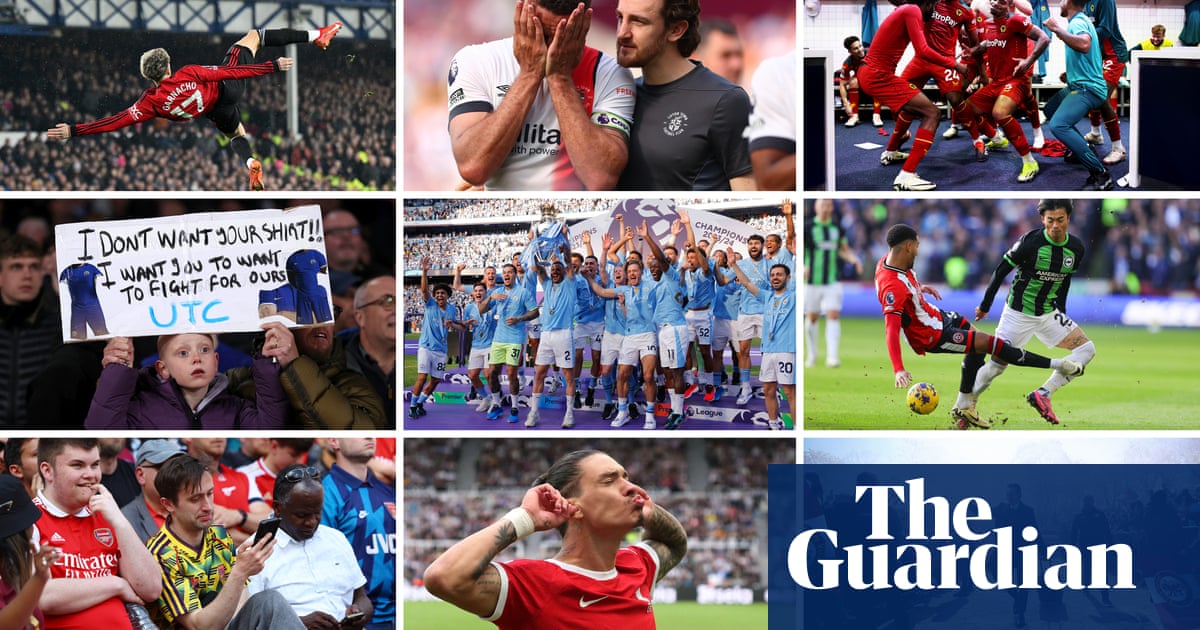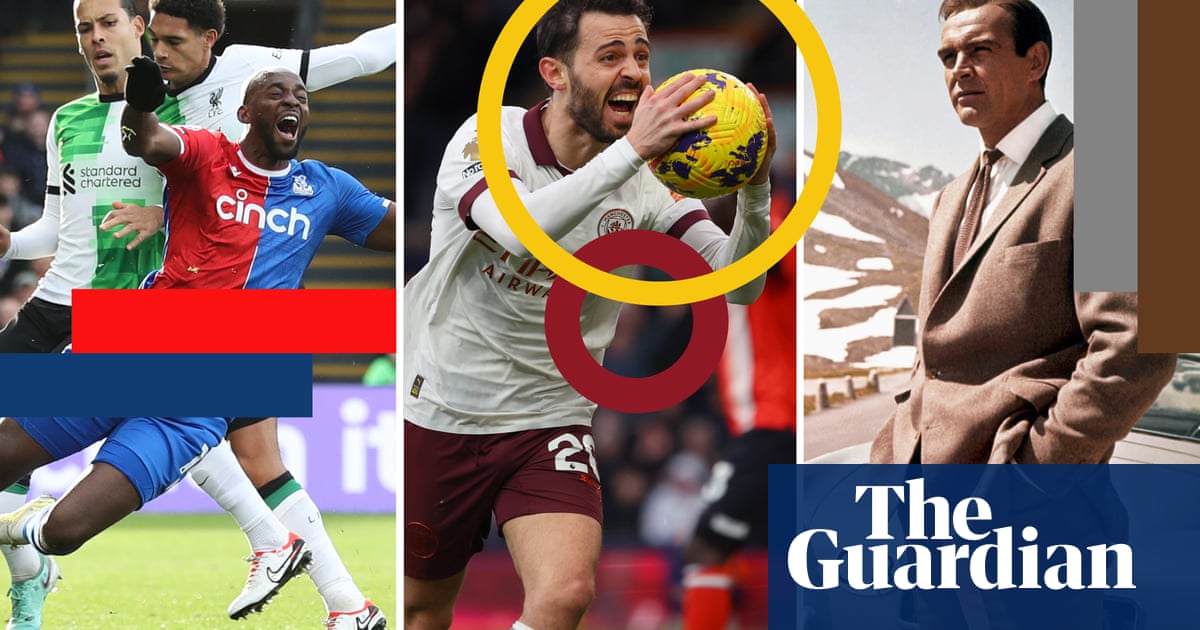
Eagle-eyed readers who have been following this series of all-time Premier League selections will shortly notice that the player we have declared the finest of the past 25 years is, curiously, not good enough for our combined best XI. What follows will not chime with everyone’s opinion, or even, clearly, our own. Eric Cantona was a marvellous player, the kind of maverick genius man for the big occasion who gets singled out for individual awards, but two other forwards exist whose claims for a first-team place are in my opinion indisputable, which leaves no room for Cantona, Luis Suárez, Wayne Rooney, Sergio Agüero or any number of strikers who have thrilled and bewitched the Premier League.
Besides, something had to be done to stop Manchester United’s dominance of the past quarter-century turning this into a best-of-the-Sir-Alex-Ferguson-years selection. In all, 27 of the 30 people to have won the league four or more times in the Premier League era played at Old Trafford under the Scot but only two of them – plus two players who won three titles there – are in our XI. There could certainly have been a couple more or a fabulous team could be compiled containing none at all. There is certainly no shortage of candidates for selection.
There exists a more useful guide to a player’s impact than mere medal counts, in the shape of the PFA team of the year. Since 1992 a total of 275 places in 25 teams have gone to 148 players, creating an A to Z of the domestic game’s great names, from Adams to Zabaleta. It throws up some curious anomalies: Dennis Bergkamp, who won three league titles and spent more than a decade decorating the Arsenal team with his peerless grace, and Peter Schmeichel, who spent a cumulative nine Premier League seasons at Manchester United, Aston Villa and Manchester City and was five times a champion, each made the list only once. If this were the only measure of a player’s contribution to the Premier League theirs were no greater than those of Stig Inge Bjornebye, Pascal Chimbonda and Sylvinho, who between them won three League Cups.
Agüero, who has scored 122 goals in 181 Premier League games and won two league titles over six years, has never made the list; neither has Gareth Barry, who has played more Premier League games than anyone on earth except Ryan Giggs (and is only four appearances away from catching him). Among goalkeepers, Tim Flowers, Shay Given, Joe Hart and David James all got picked twice but since Schmeichel’s departure Manchester United goalkeepers have become the default choice, with David de Gea named four times, Edwin van der Sar three times and Fabien Barthez once. Elsewhere it is perhaps surprising that Rooney appeared no more than David Batty (three times) and that Dele Alli has already clocked up as many appearances as Paul Scholes (two). Simply picking the players in each position who have appeared most often instantly conjures an excellent team (for the record, in 4-4-2 formation: De Gea; G Neville, Terry/Vidic, Ferdinand, Cole; Ronaldo/Beckham, Vieira [selected by my colleague Amy Lawrence as the league’s best signing], Gerrard, Giggs; Shearer, Henry) but unfairly rewards longevity of achievement over pure impact. It is hard, however, to argue that any player outside this 148 deserves serious consideration for this list.
Goalkeeper
Petr Cech Chelsea/Arsenal
Cech has been extraordinarily dependable and with 149 clean sheets has more top-flight shutouts than any other Premier League goalkeeper. He kept 25 clean sheets in the 2004-05 season alone, when Chelsea had the most impressive defensive statistics of the past quarter-century. Gianluigi Buffon considers him “the best goalkeeper in this era” and José Mourinho declared in 2013: “I always thought, even when I was not at Chelsea, that we have the best goalkeeper in the world in Petr.” In 2006 he fractured his skull in a collision with Reading’s Stephen Hunt, an injury that evidently also upset his confidence, but more than a decade later he remains the first-choice goalkeeper for one of the nation’s top clubs.
Right-back Rob Jones Liverpool
On 28 September 1991 the 19-year-old Jones played at right-back for Crewe against Gillingham in the Fourth Division. The following weekend he started for Liverpool against Manchester United in a televised game at Old Trafford, marking Ryan Giggs. Four months later he started his first match for England. His rise was rocket propelled and his performances stellar. Over the following seasons Giggs and David Ginola picked him out as the Premier League’s finest defender; he was remarkably assured and outstanding in all aspects of the game (except shooting). Virtually ever-present for Liverpool in the first four Premier League seasons, his body then started to let him down. By the age of 28 he had retired.
Centre-back Tony Adams Arsenal
Adams was not only an inspirational English centre-back, captain of club and country, but he became in many ways an embodiment of the Premier League itself and the changes it forced upon the domestic game. By the time the top flight rebranded, Adams was well established at the heart of Arsenal’s defence, with 19 England caps and four of his five international goals behind him. He also drank too much and trained too little but all that was soon to change. Adams recently said that Arsène Wenger is “essentially not a coach” but the Frenchman’s arrival certainly coincided with a transformation of Adams’s game and resulted in a goal against Everton in 1998 that was among the most joyful of the past 25 years.
Centre-back Jaap Stam Manchester United
Stam became the most expensive defender in history when Ferguson spent £10.75m on him in 1998. He spent only three seasons in England but what years they were, bringing a hat-trick of league titles and one unprecedented Treble. He was tall, extraordinarily strong and yet also fast: simply put, opponents could not go past him, through him or over him. And then, suddenly, he was gone. There had been an achilles injury and a book that Ferguson considered a little too frank but most of all United needed the money. Stam was informed, in a petrol station forecourt, that he would be sold to Lazio. “It was one of the mistakes I made,” Ferguson later admitted. “Hopefully I haven’t made too many but that was one.” As the BBC’s Mike Ingham put it: “Without Jaap Stam, Sir Alex would still be Alex.”
Left-back Ashley Cole Arsenal/Chelsea
It is curious, given England’s problems on the left flank between Stuart Pearce’s retirement and Cole’s emergence, that the vast majority of the left-backs in the PFA team of the year since 1992 have been English. Ryan Bertrand, Wayne Bridge, Luke Shaw and Alan Wright have had a go; Danny Rose, Graeme Le Saux and Leighton Baines have been picked twice. Cole surely deserves more than his four selections – having famously “almost crashed [his] car” when Arsenal offered him £55,000 a week rather than his desired £60,000, one can only imagine what must have happened when he was told his peers considered Gaël Clichy the better left-back. Cole lost only 14.8% of his 385 Premier League games, was an outstanding international – if his performance against Cristiano Ronaldo at Euro 2004 could be magically bottled it would be extremely potent and instantly intoxicating – and was remarkably consistent.
Right midfield
Cristiano Ronaldo Man Utd
Real Madrid have witnessed most of Ronaldo’s career but Manchester United surely saw the best of it, the part where he transformed before our very eyes from a brilliantly talented, excessively lollipopping trickster into the world’s most fearsome and focused attacking force. In his first two seasons combined he scored only nine league goals but there were 17 in his fourth – when he was named player of the season by the PFA and the Football Writers’ Association – and 31 in his fifth, when he won the golden boot as well as the two player of the year gongs. After another 18 in 2008-09 he was on his way to Spain.
Central midfield Paul Scholes Manchester United
In 2011 Xavi memorably told the Guardian that Scholes was “the best central midfielder I’ve seen in the last 15, 20 years. He’s spectacular, he has it all: the last pass, goals, he’s strong, he doesn’t lose the ball, vision.” Zinedine Zidane considered him “undoubtedly the greatest midfielder of his generation”. Scholes was, like many of the greatest artists, underappreciated during his career – his two appearances in the team of the year put him level with Stephen Carr, Bacary Sagna, Shay Given and William Gallas – and though he won 66 England caps he completed only 26 international games, three fewer than Barry. Perhaps this was because his career coincided with those of Steven Gerrard and Frank Lampard, both of whom certainly trumped him for attention, but in terms of pure ability Scholes probably surpasses them both, and most others.
Central midfield
Steven Gerrard Liverpool
Ferguson, not entirely unbiased when it comes to matters Liverpool, may have been “one of the few who felt Gerrard was not a top, top player” but the praise of the former midfielder’s team-mates shows quite how esteemed he was. The two-times European Championship and one-time World Cup winner Fernando Torres declared him “by far the best player I have ever played with”; Danny Murphy called him “the best midfielder I’ve ever seen”; Álvaro Arbeloa thought him “the most complete player I’ve played with”. Gerrard was only once named the PFA’s player of the year but he was in the team of the year an unprecedented eight times. Nobody else has managed more than six appearances. Lampard, the Englishman with whom he is most often compared, managed it three times. For longevity of excellence, and for displaying it across all attacking and defensive duties, Gerrard stands alone.
Left midfield Ryan Giggs Manchester United
No player has played more Premier League games than Giggs, with 632, nor has anyone created more Premier League goals than the Welshman’s 167 (the next best, Cesc Fàbregas, is on a distant 107). Given the lack of outstanding specialist left wingers – David Ginola is probably next on the list before you get to Damien Duff, Ashley Young and Stewart Downing – it is hard to imagine a plausible all-time Premier League XI without him. “Only two players made me cry when watching football,” the Italian forward Alessandro Del Piero memorably said. “One was Diego Maradona and the other Ryan Giggs.”
Striker Alan Shearer Blackburn/Newcastle
The best goalscorer of the Premier League era. Shearer scored tap-ins, he scored headers, he scored free-kicks and he scored jaw-dropping 30-yard screaming volleys. He registered a record 11 Premier League hat-tricks, was the division’s top scorer for three successive seasons, between 1994 and 1997, and created perhaps the single most boring, instantly recognisable goalscoring celebration known to modern humanity. He has not made a habit of making headlines off the pitch – he famously celebrated Blackburn’s 1995 title victory by “going home to creosote the fence” – but was routinely the focus of attention on it.
Striker Thierry Henry Arsenal
“I’m obsessed,” Henry said, “with the idea of making my mark on history.” He certainly made his mark on the Premier League, scoring 175 league goals for Arsenal at the rate of one every 1.47 games and turning himself into an unstoppable blend of thrilling pace and technical perfection. Lilian Thuram considered him “the fastest man ever to lace up a football boot”, a claim with which only recreational footballer Usain Bolt could seriously quibble. Zidane called him “probably, technically, the most gifted footballer ever”, which may, on reflection, be true. He was tall, strong, fast, intelligent and skilful; in any game of positive-footballing-attributes bingo, Henry is the full house.












